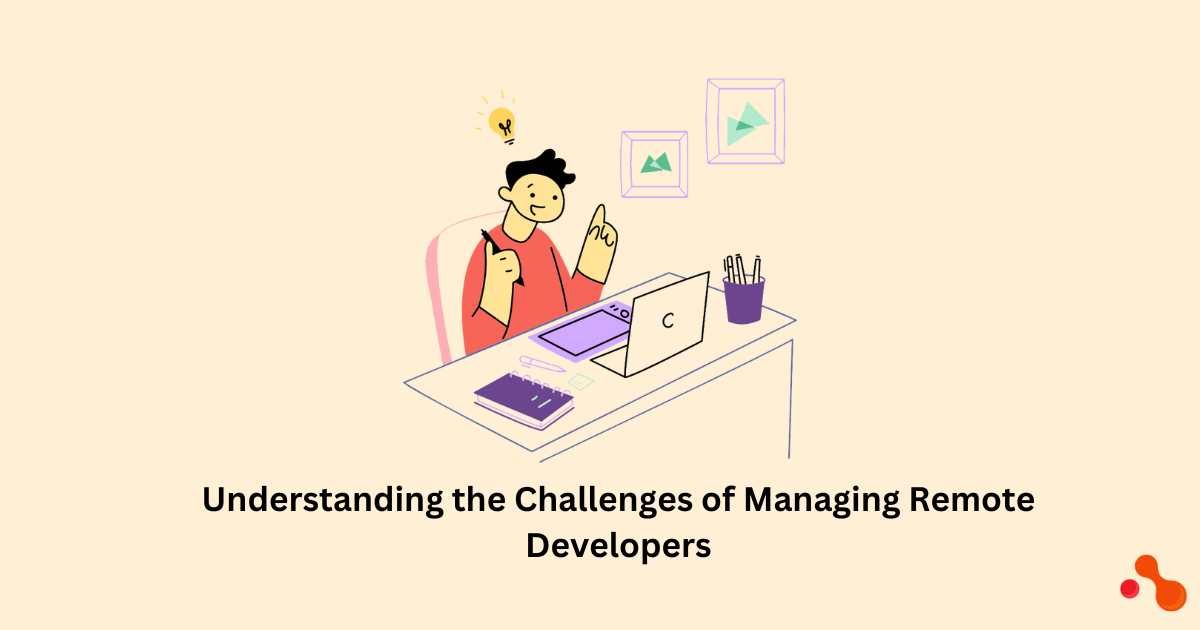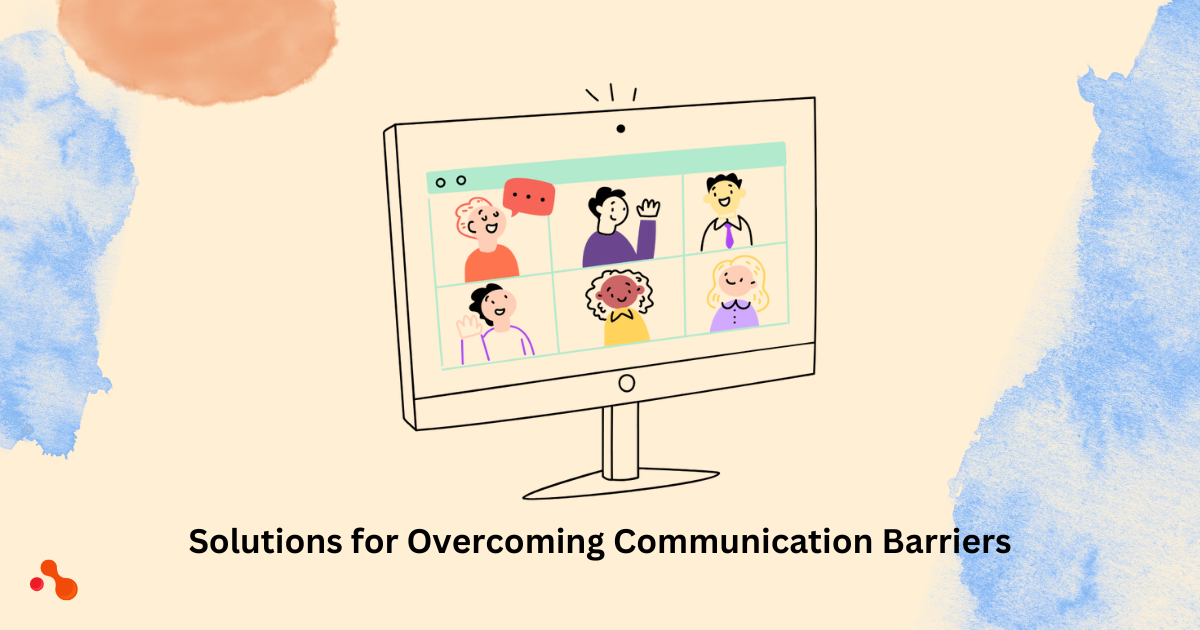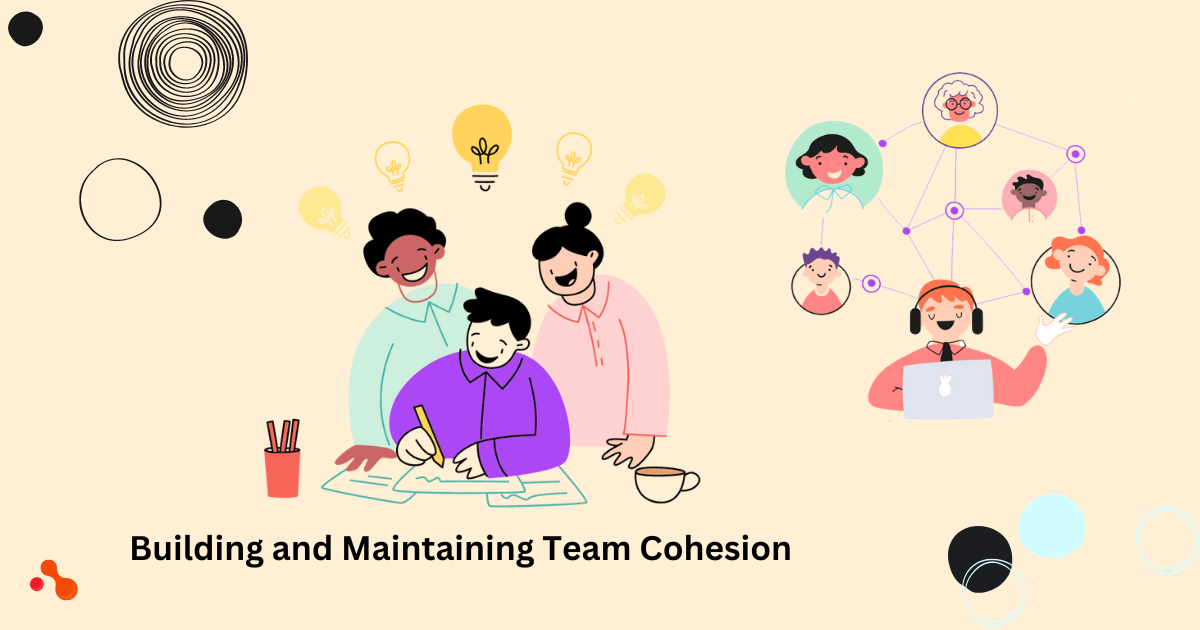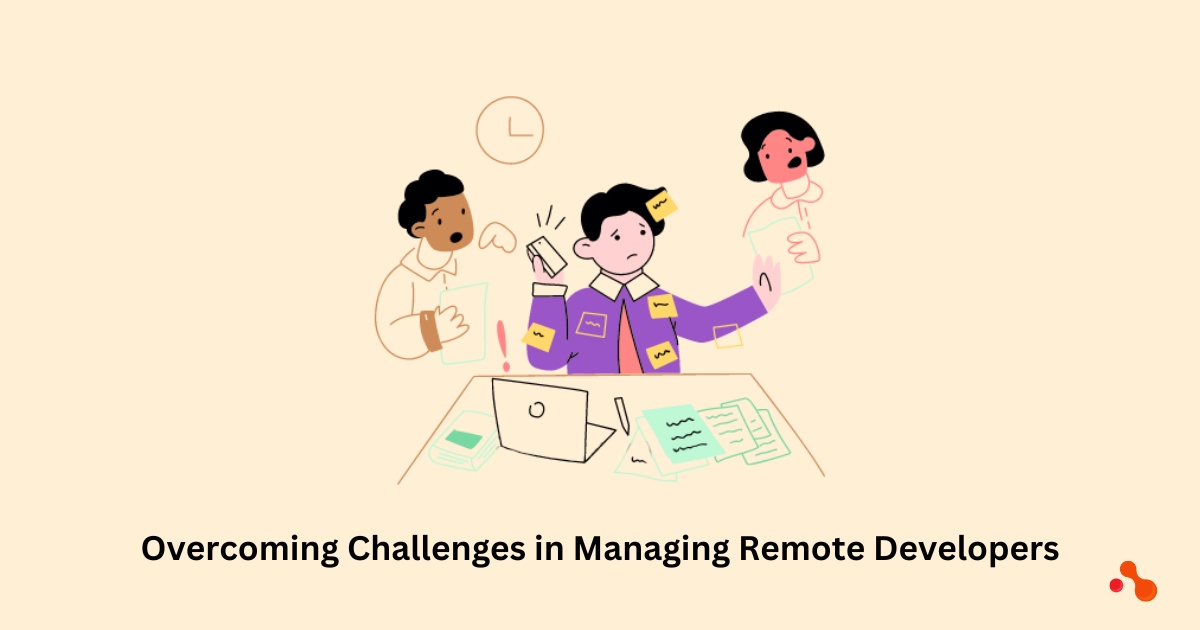Introduction
In today's interconnected world, remote development teams have become increasingly essential for businesses looking to expand their talent pool and drive innovation. However, managing remote developers comes with its own set of challenges. This blog addresses the growing obstacles organizations face in managing remote developers and provides practical solutions for overcoming them, whether you are considering hiring developers or hiring remote developers for your team.
Understanding the Challenges of Managing Remote Developers

Communication Barriers
- Time zone differences: When you hire remote developers, they may be located in different time zones, making real-time communication challenging. It can result in delayed responses and difficulty scheduling meetings or resolving urgent issues.
- Language and cultural differences: Remote developers from diverse backgrounds may have varying levels of fluency in the primary language used within your team. Cultural differences can also impact communication styles and understanding.
Building and Maintaining Team Cohesion
- Lack of face-to-face interaction: Remote teams need to take advantage of the benefits of in-person communication, such as non-verbal cues and spontaneous interactions, which can hinder team bonding and trust-building.
- Isolation and potential for disengagement: Remote developers may experience feelings of isolation due to the absence of physical proximity to colleagues. This can lead to decreased motivation and disengagement.
Ensuring Productivity and Accountability
- Monitoring progress and deliverables: With remote developers, tracking their progress and ensuring they meet project milestones and deliver on time can be challenging.
- Trust and micromanagement: Managers may have concerns about trusting remote developers to work independently without constant supervision, while developers may fear micromanagement and a lack of autonomy.
D. Knowledge Sharing and Collaboration
- Access to information and resources: Remote developers may need help accessing important information and resources readily available to in-office teams.
- Remote teamwork and coordination difficulties: Collaboration and coordination among remote developers can be challenging due to the need for physical proximity and real-time interaction.
Solutions for Overcoming Communication Barriers: Effective Strategies for Managing Remote Developers

One of the major challenges in managing remote developers is communication. However, overcoming these barriers and ensuring smooth collaboration is possible with the right approach and tools. Here are some practical solutions that can help you effectively manage your remote development team, whether hire developers or remote developers.
Establishing clear communication channels
- Selecting appropriate tools and platforms: Utilize communication tools and platforms that cater to remote work. Examples include project management tools like Asana or Trello, chat platforms like Slack or Microsoft Teams, and video conferencing tools like Zoom or Google Meet.
- Setting communication expectations and guidelines: Clearly define expectations for communication, including response times, preferred communication channels, and availability hours. Establish guidelines that promote clarity and understanding among team members, ensuring everyone knows how and when to communicate.
Implementing effective meeting practices
- Scheduling regular meetings with defined agendas: Set up recurring meetings with a clear agenda to ensure that discussions remain focused and productive. Share the agenda in advance, allowing team members to come prepared and contribute effectively during the meeting.
- Encouraging active participation and feedback: Create an inclusive environment where all team members feel comfortable speaking up and sharing their ideas. Encourage active participation by inviting input from everyone and fostering an open feedback culture. This helps remote developers feel valued and engaged in the decision-making process.
Promoting cross-cultural understanding
- Encouraging cultural awareness and sensitivity: Promote an environment where team members appreciate and respect different cultural perspectives. Encourage open discussions about cultural practices, celebrations, and customs. This can help build empathy and foster a more inclusive work culture.
- Facilitating language and translation support: Language barriers can hinder effective communication in remote teams. Consider using translation tools or providing language support, such as language courses or translation services, to bridge the gap and ensure everyone understands each other clearly.
Building and Maintaining Team Cohesion

Hire remote developers in today's digital age has become common for many organizations. However, managing a team of remote developers comes with its own set of challenges. One of the key obstacles managers face is building and maintaining team cohesion when team members are spread across different locations.
Facilitating virtual team-building activities
- Virtual icebreakers and team bonding exercises: Initiate virtual icebreakers at the beginning of team meetings or projects. These activities can be as simple as asking each team member to share an interesting fact about themselves or their favourite hobby. Team bonding exercises like virtual escape rooms or online trivia games can encourage collaboration and friendly competition among remote developers.
- Virtual social events and informal interactions: Organize virtual social events to promote casual interactions among team members. For example, you can plan virtual coffee breaks or lunch sessions where team members can join video calls and chat about non-work-related topics. Creating informal channels such as a dedicated chat group or virtual water cooler can encourage spontaneous conversations and foster a sense of camaraderie.
Encouraging frequent and transparent communication:
- Open and inclusive team discussions: Create a culture of open communication by providing platforms for team discussions. This can be done through team meetings, group chats, or collaboration tools. Encourage everyone to share their thoughts, ideas, and concerns. Active participation from all team members will foster a sense of belonging and ensure everyone's voice is heard.
- Recognizing and celebrating individual and team achievements: Acknowledge and appreciate individual developers' and team's efforts and accomplishments. Celebrate milestones, successful project deliveries, and exceptional performances. Publicly recognizing achievements can motivate team members and strengthen their connection to the team.
Establishing a sense of belonging and purpose:
- Clarifying team goals and expectations: Ensure the team is aligned with a common vision and goals. Communicate the team's purpose, objectives, and expectations. This will give remote developers a clear sense of direction and help them understand how their work contributes to the overall success of the project and organization.
- Providing opportunities for personal and professional growth: Invest in the growth and development of your remote developers. Offer training programs, workshops, or mentorship opportunities. Please encourage them to expand their skill sets and provide avenues for career progression.
Ensuring Productivity and Accountability: Solutions for Remote Development Teams

Hiring developers for your organization has become easier than ever in today's digital age. Hiring remote developers has gained significant popularity with the rise of remote work. However, managing remote developers comes with its own set of challenges. This article will discuss effective strategies to ensure productivity and accountability when working with remote developers, using keywords such as "hire developers" and "hire remote developers."
Setting Clear Goals and Expectations:
- Defining Project Milestones and Deliverables: Clearly outline the project's key milestones and the specific deliverables expected from each developer. This clarity helps in aligning everyone's efforts towards common objectives.
- Establishing Realistic Timelines and Deadlines: Set realistic timelines and deadlines for each project phase. Consider the complexity of the tasks and the availability of resources to ensure attainable goals.
Implementing Effective Project Management Practices:
- Utilizing Project Management Tools and Software: Invest in project management tools that facilitate collaboration, task tracking, and communication. Tools like Asana, Trello, or Jira can streamline project workflows and enhance transparency.
- Tracking Progress and Providing Regular Feedback: Regularly monitor the progress of tasks and provide timely feedback to remote developers. This helps keep everyone accountable and ensures that the project stays on track.
Fostering Trust and Autonomy:
- Empowering Developers with Decision-Making Authority: Encourage remote developers to take ownership of their work by granting them decision-making authority. This autonomy boosts their motivation and accountability.
- Providing Continuous Support and Resources: Remote developers should have access to the necessary resources and support to complete their tasks effectively. Offer technical assistance, training opportunities, and a responsive communication channel to address any queries or challenges they may encounter.
Facilitating Knowledge Sharing and Collaboration: Solutions for Easy Understanding

When managing remote developers, one of the key challenges is ensuring effective knowledge sharing and collaboration. In this section, we will explore practical solutions that are easy to understand and implement, regardless of whether you hire developers or hire remote developers:
Creating a Centralized Knowledge Repository:
- Documenting processes, best practices, and guidelines: To promote knowledge sharing, it's important to document the processes, best practices, and guidelines followed by your development team. This could include coding standards, project management methodologies, and other relevant documentation.
- Encouraging collaboration through shared documents: Collaborative document-sharing platforms like Google Docs or Microsoft Office 365 can be incredibly useful for remote teams. These tools enable multiple team members to work on a document simultaneously, providing real-time updates and comments.
Leveraging Collaboration Tools and Platforms:
- Using virtual whiteboards, code repositories, and version control systems: Remote development teams can benefit from virtual whiteboards, code repositories (such as GitHub or Bitbucket), and version control systems (like Git). Virtual whiteboards enable real-time brainstorming and visual collaboration.
- Promoting real-time collaboration and feedback loops: Instant messaging platforms like Slack or Microsoft Teams facilitate real-time collaboration. They allow developers to communicate quickly, share code snippets, and seek feedback instantly.
Encouraging Mentorship and Peer Learning:
- Pair programming and code reviews: Pair programming involves two developers working together on the same code, encouraging knowledge exchange and improving code quality. On the other hand, code reviews allow team members to review each other's code for quality, adherence to best practices, and knowledge sharing.
- Establishing mentorship programs and knowledge-sharing sessions: Creating mentorship programs within your remote development team is an effective way to facilitate knowledge-sharing. Pairing experienced developers with newcomers or less experienced team members can help bridge knowledge gaps and promote learning.
Conclusion
Whether you hire developers or remote developers, implementing these solutions can foster a culture of knowledge-sharing and collaboration within your remote development team. These strategies are designed to be easily understandable and applicable, enabling you to overcome the challenges of managing remote developers and reap the benefits of a collaborative and productive remote work environment.


No comments yet